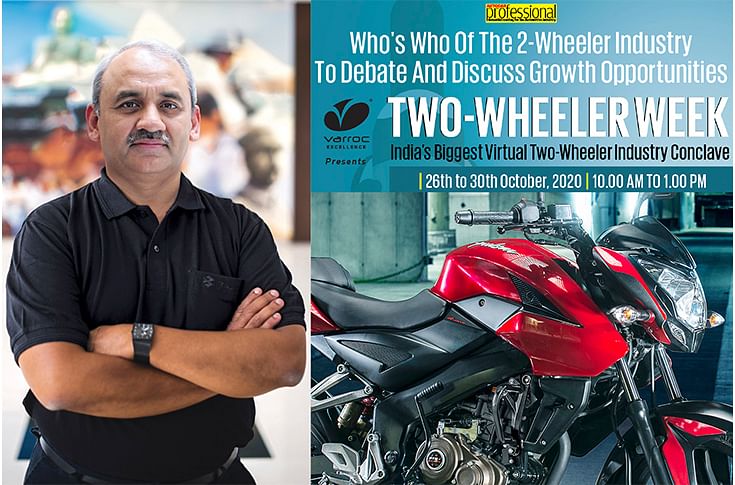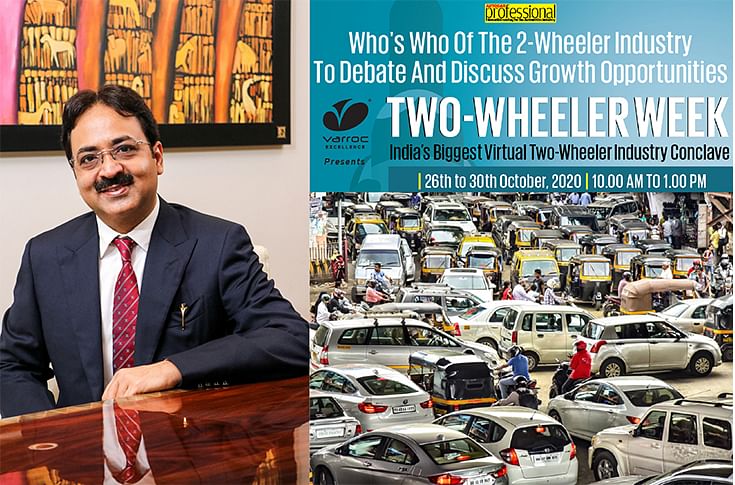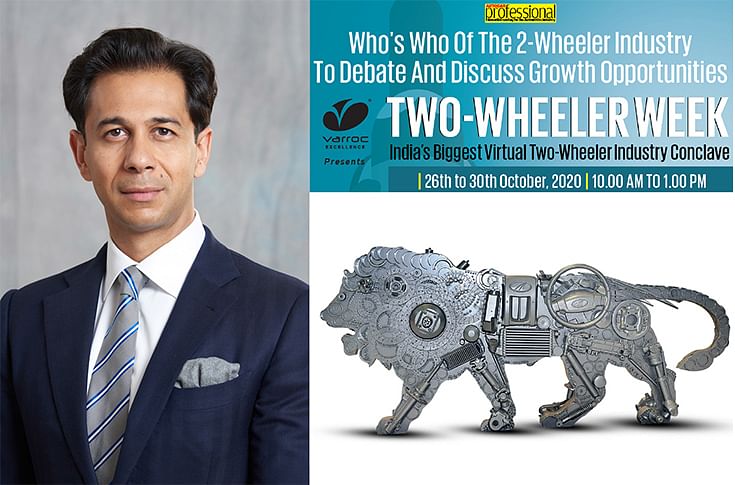Industry experts concerned about sustainable two-wheeler demand
According to most industry experts, it is an arduous road to recovery and green shoots remain patchy.
Day one of Autocar Professional’s Two-Wheeler Virtual Conclave brought together a host of industry veterans at India’s biggest virtual industry conclave. Though the pick-up in demand and the expectation of festive boost to sales brought some cheer, experts remained concerned about how sustainable the demand will be over the long-term. According to most of the speakers, it is an arduous road to recovery and green shoots remain patchy.
The panel of speakers Day 1 included
- Rakesh Sharma, Executive Director, Bajaj Auto & President, International, Motorcycle Manufacturers Association (IMMA),
- Deepak Jain, President, ACMA and CMD, Lumax Industries,
- Vinkesh Gulati, President, FADA
It was moderated by Murali Gopalan, Consulting Editor, Autocar Professional.
Rakesh Sharma: ‘I think road to recovery is long and arduous.’

Rakesh Sharma, Executive Director, Bajaj Auto & President, International, Motorcycle Manufacturers Association (IMMA) called the, “road to recovery is long and arduous. Despite the fragility in supply chain, they have done a tremendous job. Because of that I do not see supply side issues a huge concern. The Indian supply chain has shown its resilience. I am more concerned about vitality of the demand situation.”
Sharma emphasises on the need to take stock of the situation after the festive season as he is apprehensive about, “problems on the demand side rather than supply side.”
Commenting on policy moves and key legislations, Sharma reiterates the, “need to look at the current situation in a holistic fashion. Consistency in policy crucial to bring back sustainable demand.”
He points out that price and demand very elastic and lowering GST can have huge implication, “GST reduction could be an important initiative that Govt can take and can surely catalyse demand. A thriving two-wheeler industry can enable India to take a leadership role in global arena. GST cut reduces prices and given that demand is price sensitive and elastic, it has strong correlation with demand.”
Sharma highlighted how both demand and supply side remained vulnerable due to Covid situation, especially for next 18 months but he feels there is a case for lower inventory, “With increasing digitisation, there is a case for lower inventory levels. High inventory levels should not be seen as a dealer problem. It is an OEM problem."
Commenting on how the electric two-wheeler demand will pan out going forward, Sharma feels it is still early days, “The customer is value conscious; the last few year’s trend indicates that if the power storage cost reduces, the business will pick up pace. The general consensus is that in 5-7 years, EVs will become a real threat to conventional IC engines.”
Overall he sees headwinds for the industry over the next two-three years. According to him, “ See strong winds of change hitting the industry, the two-wheeler sector needs to be prepared. The level of integration still not adequate on demand side. I think business needs to adapt to new normal, current requirement. Need to take advantage of digitisation, analytics and other technological tools available. “
Vinkesh Gulati, President, FADA: ‘Need for caution primary on the inventory level’

Even dealers seem to be worried about how sustainable the demand is over the long-term. According to Vinkesh Gulati, president, FADA, “though we see growth on a month-on-month basis, it will take time to witness some year-on-year growth. We are still not there at the pre-Covid level. The September figure showed degrowth of around 12 percent YoY. Also, there is a good enquiry level this festive season. Even with the rural buoyancy, there are still some factors where we do not see demands that we usually see during this time. Work From Home and online schools, colleges have impacted the demand for two-wheelers.”
Also, FADA is cautious and advised the OEMs, dealers to take more precaution to avert any unfortunate situations. He also advised that dealers have to be more cautious on the inventory during the festive season. “Even the last two festive seasons were not as we expected and that was the trigger for the automotive slowdown in the Indian market. We are recovering now and hope it gets better and give us the last year numbers. But, there are industries that have not reached the level that the auto industry has reached. Even OEMs are gunning for full production. Also, if there is dampness in sales excess inventory will cause a concern,” he explained.
“The sale during Navaratri was a mixed bag. For example, the state of Gujarat had a 30 percent decline over the last year. Overall, we expect a 10-15 percent drop. This is because of the restricted activity due to Covid. Things might change for the Diwali season and we hope it will push for sales. If the sales numbers go up the issue will slowly come down. And, in 2-3 years with support from industry and the government we will see the growth coming back,” Vinkesh added.
Sharing his views on the Atmanirbhar Bharat of two-wheelers and the effect it will have over the customers, the FADA president said, “Higher two-wheeler exports will help support the domestic market and also enable access to cost-effective two-wheelers. Higher localised content will reduce product costs. Margins are important but reduced prices will help give demand an impetus. Indian two-wheeler is not a luxury but a need and necessity. If two-wheeler becomes Aatmanirbhar, it will be best for Indian customers."
He is hopeful that, “positive demand scenario continues in Q4 of current fiscal too. I hope Covid has been successfully put in the rear-view mirror.”
Deepak Jain: ‘Q4 FY2021 to be the litmus test in terms of demand in the automotive sector’

Bringing in a auto component supplier’s perspective at this juncture, Deepak Jain, President, ACMA and CMD, Lumax Industries says, “Q4 of FY2021 will be the litmus test in terms of demand in the automotive sector. Need to see when we can restart investment in the supply side.
Jain is cautiously optimistic about the growth prospects of the two-wheeler segment and says, “Festive demand has put a lot of pressure on supply chains. Restaffing of workforce due to migration of labours has led to retraining of staff and that takes a lot of time. Raw material shortage also a concern. There is financial stress in supply chain too.”
According to Jain, the current “adversity has brought about unity within the automotive segment. There is massive collaboration between all stakeholders, from supply-side to dealer front. The two-wheeler industry is a shining example of Atmanirbharta.”
Jain highlights that self-reliance, “especially in two-wheeler space, is doable given the domestic scale and capacity that is truly global. The industry has given a lot of impetus for undertaking engineering collaboration, help innovation and makes it easier for exports too.”
Sharing his outlook for the two-wheeler segment, Jain says the current crisis ha, “given a fillip to industry and helped industry showcase its resilience. We have to be cautious and take the lessons learnt in future to make industry value based, quality conscious.”
RELATED ARTICLES
Cosmo First diversifies into paint protection film and ceramic coatings
The Aurangabad, Maharashtra-based packaging materials supplier is leveraging its competencies in plastic films and speci...
JSW MG Motor India confident of selling 1,000 M9 electric MPVs in first year
The 5.2-metre-long, seven-seater luxury electric MPV, which will be locally assembled at the Halol plant in Gujarat, wil...
Modern Automotives targets 25% CAGR in forged components by FY2031, diversifies into e-3Ws
The Tier-1 component supplier of forged components such as connecting rods, crankshafts, tie-rods, and fork bridges to l...






 26 Oct 2020
26 Oct 2020
 7383 Views
7383 Views










 Autocar Professional Bureau
Autocar Professional Bureau




